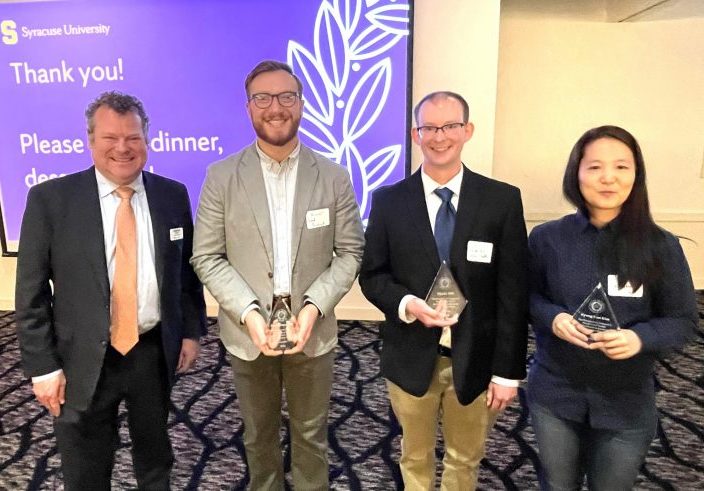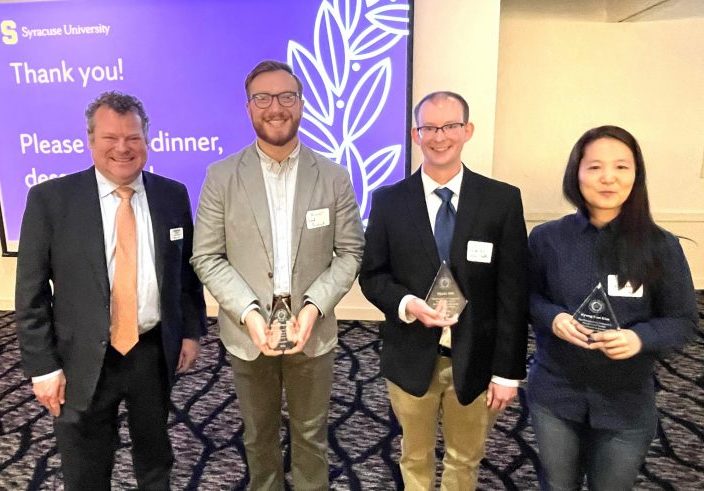New Awards Presented at Postdoctoral Appreciation Dinner
The research and creative, teaching and service contributions of Syracuse University’s postdoctoral scholars, including three who received special awards, were recognized at last week’s celebration of the National Postdoctoral Association’s Postdoc Appreciation Week.
The Office of Postdoctoral Affairs and the Graduate School co-hosted the annual appreciation dinner to celebrate the postdoctoral community and to celebrate the scholars with their guests, faculty mentors and University leaders and staff. The evening included recognition of three postdoctoral scholars as the first recipients of the new Vice President for Research’s Postdoctoral Award for Excellence in Research and Creative Work.
“The dinner is meant to express appreciation for and highlight the important contributions postdoctoral scholars make to Syracuse University’s research and creative activities,” says Kimberly Vanderhoef, associate director of postdoctoral affairs. “The event provides an opportunity for our postdoctoral scholars and their family, friends, mentors and collaborators to applaud these contributions and to socialize.”
Duncan Brown, vice president for research, says postdoctoral scholars are essential to the University’s research and creative mission. “Postdocs are critical to the success of the University. As they grow their own skills, they contribute intellectual vigor to their fields and enrich the experiences of our undergraduate and graduate students through their mentoring. As faculty, we rely on our postdocs in many ways. This event and the new awards provide a way for us to show our appreciation for people who are key members of our research teams.”
The recipients of the Vice President for Research’s Postdoctoral Award for Excellence in Research and Creative Work were chosen based on the outstanding quality and impacts of their research and creative activity. Winners received awards of $750 and presented summaries of their work to dinner attendees. They are:
- Kyung Eun Kim, a researcher in the Department of Physics in the College of Arts and Sciences
- David Fastovich, who works in the Department of Earth and Environmental Sciences in the College of Arts and Sciences
- Dustin Hill, a scholar in the Department of Public Health in the Falk College of Sport and Human Dynamics

Kim’s research predicts the structure and mechanics of biological tissue and its composition and outer shell using computational and analytical modeling techniques. She works with Jennifer Schwarz, professor of physics, to examine the mechanical response and changes cells undergo when the tissues are compressed. The research pertains to a trait that is a hallmark of inflammatory disease in the body. She is also studying how tissue compression affects other disease conditions. Her research has applications in developmental biology, cancer research and tissue engineering.
Fastovich works with faculty mentor Tripti Bhattacharya, Thonis Family Professor of Paleoclimate Dynamics and assistant professor of Earth and environmental sciences. He studies Earth’s past climate to understand current climate changes, predict future rainfall changes from climate warming, determine what mechanisms affect climate changes and assess the impacts on biological systems over time and geographies. The work helps provide an understanding of how climate and ecosystems interact, knowledge that is crucial to preparing nature and human society for worldwide changes as the planet continues to warm.
Hill is an environmental epidemiologist and data scientist who studies environmental inequality, pollution and human health. He has worked with the New York State Wastewater Surveillance Network and David Larsen, Falk professor and public health department chair, since 2021. Hill has provided advanced statistical modeling of wastewater data, surveyed local health departments on data use and mapped disease spread based on social equity. He is now using wastewater surveillance data for viral pathogens to create statistical models to predict future disease spread. He also works with co-mentor and Falk professor Brooks Gump, Falk Family Endowed Professor of Public Health, on the child health impacts of exposure to industrial air pollution in Syracuse.
The Office of Postdoctoral Affairs, which is part of the Office of Research, was formed last fall. It provides centralized resources and dedicated staff to serve the interests and well-being of postdoctoral scholars across the University. The office supports postdoctoral professional and career development in close collaboration with the Graduate School and other campus partners. The office also collaborates with staff across the University to facilitate administrative processes related to hiring and onboarding postdocs. The launch of the new office is intended to uphold the University’s commitment to a quality campus experience and positive career outcomes for postdoctoral scholars while advancing the University’s research and creative mission.



